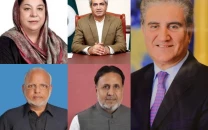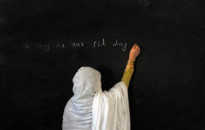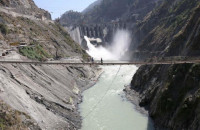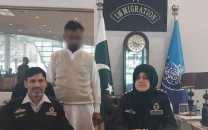America’s SPECTRE syndrome in Afghanistan
If Haqqani network was a stumbling block between bad Afghanistan and idyllic Afghanistan, it would not be a problem.

All the troubles of the US and its allies stem from this reincarnation of SPECTRE. The only entity that can take care of this shadowy organisation is Pakistan. The capacity of this organisation to trouble America is exclusively owed to its ability to retire to North Waziristan after striking inside Afghanistan, sometime as deep as in Kabul. Its members seem to be able to fly in and out of Afghanistan, undetected, despite the presence there of US, Nato and Isaf troops.
It’s the only entity that is hampering the US from neatening up Afghanistan. Get rid of the Network and Afghanistan will be fine — the government will work, the Taliban will vanish, corruption will end, pluralism will flourish, democracy will take root, Afghan society will enter the 21st century, America will be safe and everyone will live happily ever after.
Am I being reductive? Please read the long report by the Combating Terrorism Centre at West Point which argues that the most “underappreciated dimension” of the Haqqani network is its “global character” and the “central role it has played in the evolution of al-Qa’ida and the global jihadi movement”. Read also the report about the meeting between US Secretary of State Hillary Clinton and Pakistan’s Foreign Minister, Hina Rabbani Khar ,where the “first and last thing” on the agenda was the Haqqani Network and the September 13 Kabul attack.
The fact is that the Afghanistan problem is not just about the Haqqani Network. Afghanistan has multiple problems, most of which have nothing whatsoever to do with the Haqqanis. Even if the Haqqani Network were entirely taken out, Afghanistan would remain largely the same. In fact, if the only stumbling block between an Afghanistan gone bad and an idyllic Afghanistan were the Network, Afghanistan would have been a piece of cake, not the wicked problem it has become.
Secondly, if the insurgency in Afghanistan was only run by the Haqqanis, JSOC (Joint Special Operations Command) would not be conducting thousands of night operations for the last year-and-half across all of Afghanistan, operations that are terribly unpopular.
Thirdly, if use of force was the only answer to Afghanistan’s problems, the US would have, by now, brought it under control. But the use of force, by itself, is clearly not enough. As Mr Abdullah Abdullah told me in April in Washington, what is missing is the ability of the Afghan government to reach out to its people. It is common knowledge that the Afghan governors cannot even survive in their respective vilayats without striking some kind of deal with the Taliban commanders in the area.
Fourthly, the three spectacular attacks in recent weeks, beginning with the downing of a Chinook carrying a SEAL team, the suicide attack that injured 70 US troops, both in Maydan Wardag, and now the September 13 Kabul attack clearly show that the line of communication of the insurgents cannot stretch back to North Waziristan. All these attacks have happened deep inside the Afghan territory and indicate the steady loss of control of territory by the Afghan government and the foreign troops.
If, for the sake of the argument it is conceded that the Taliban line of communication does extend back to North Waziristan, then the ability of the fighters to go deep in and mount attacks makes an utter mockery of the military and intelligence capabilities of the US and its allies despite the tremendous resources at their disposal.
Fifthly, as should be clear from Sirajuddin Haqqani’s interview to Reuters, his fighters are not based in North Waziristan. It makes eminent sense for him to have relocated to the Loya Paktia given the heightened frequency of the drone attacks in North Waziristan and the fact that the Network controls the three provinces of Khost, Paktia and Paktika. They are also unlikely to be based either in Dande Darpa Khel in North Waziristan or Zambar in Khost, both locations known to intelligence agencies.
Finally, Siraj’s interview dispels the propaganda that the Haqqani Network is Al Qaeda. Instead, Siraj told Reuters that “we would support whatever solution our shura members suggest for the future of Afghanistan”, a clear reference to the Afghan Taliban leadership. Siraj also said that they rejected previous attempts at talks by the US and the Afghan government because those overtures were aimed at “creating divisions” among the Taliban. It is therefore misleading to suggest that the Haqqanis operate outside the overall strategic objectives of the Taliban.
Siraj’s interview and signalling is in line with Mullah Omar’s Eidul Fitr message, which dealt with three basic points: the Afghanistan-specific focus of the Taliban; their readiness to negotiate meaningfully, and a warning to the neighbours to desist from interfering in Afghanistan’s internal affairs. Another important motif running through that message was Taliban’s an inclusive approach to governance. In that, this year’s Eid message is very different from the one Mullah Omar delivered last year which rejected negotiations and called for the trial of President Hamid Karzai and his political coterie.
A few quick points need to be made. The US has come round to talking to the Taliban despite some opposition to this dialogue both in Washington and Kabul. Most leading Afghan experts around the world think this is the only way forward, especially — and this is crucial — if the Taliban accept that they cannot rule Afghanistan to the exclusion of other entities. There are clear indications, and Maulana Fazlur Rehman confirmed it to some of us at a recent SAFMA (South Asian Free Media Association) meeting in Lahore, that they understand and appreciate this. Given this, and given rising opposition by the Afghans, including officials, to the use of force by the US in Afghanistan, Washington should fast track this dialogue instead of asking Pakistan to open another front for itself by going into North Waziristan. The dialogue is where Pakistan needs to play a positive role because that is where its interests must converge with that of the US.
Maulana Fazlur Rehman also backed my argument that any policy needs to make a clear distinction between the Afghan Taliban and the TTP and its affiliates. The time to go into North Waziristan would be after the US-Taliban talks have reached an advanced level. That would help Pakistan greatly in dealing a blow to the TTP network.
For all the right reasons the US and Pakistan need to cooperate rather than getting into a game of brinkmanship.
Published in The Express Tribune, September 21st, 2011.



















COMMENTS
Comments are moderated and generally will be posted if they are on-topic and not abusive.
For more information, please see our Comments FAQ